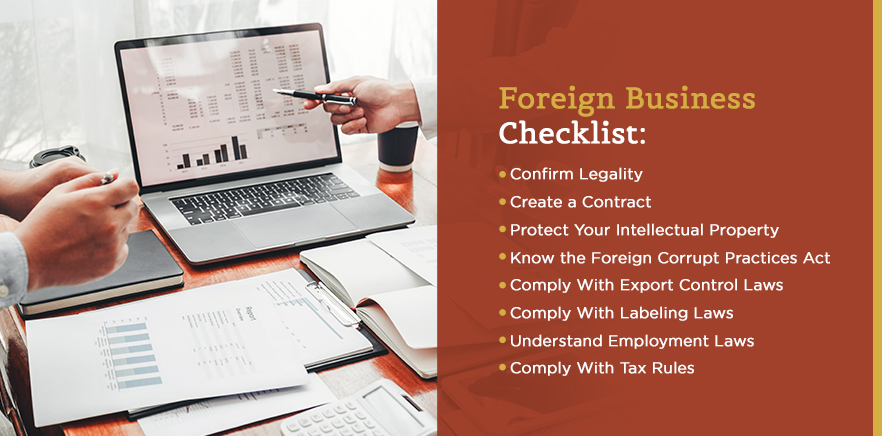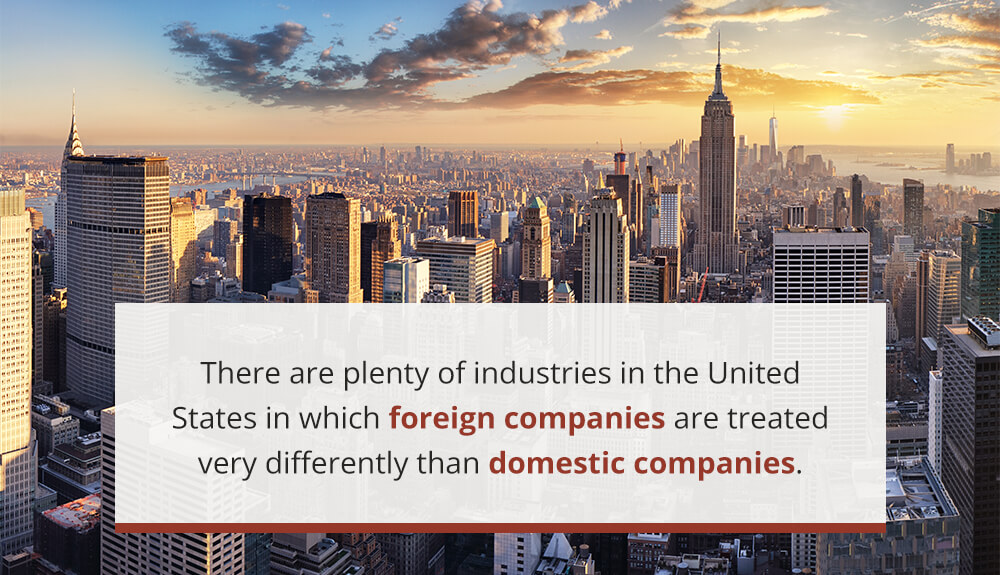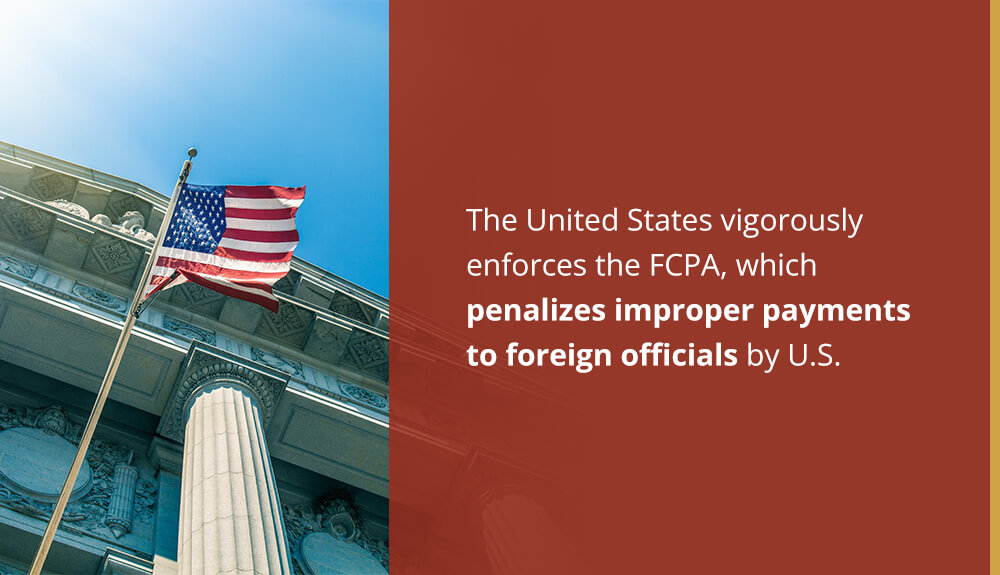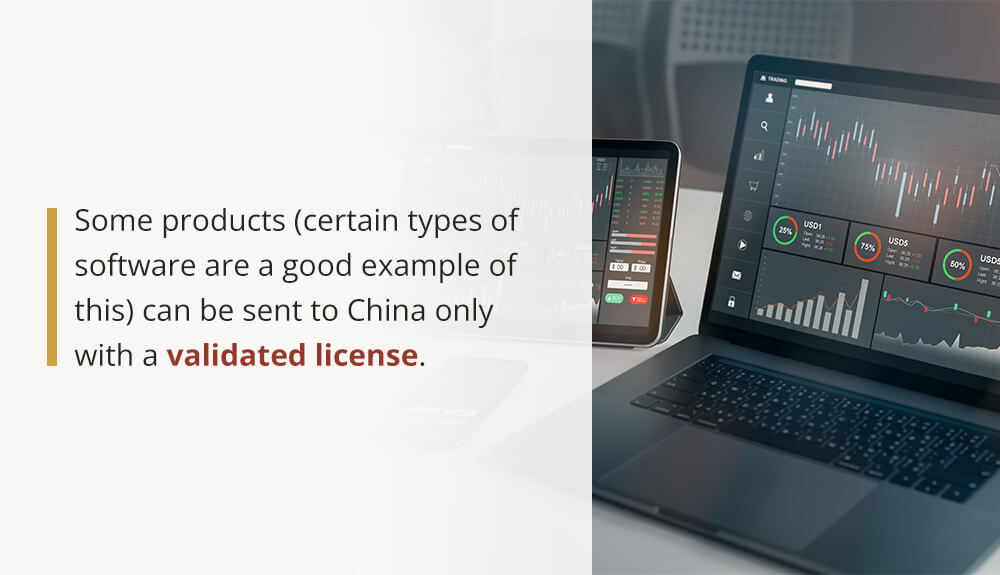Contents of this Article:
- Confirm Legality
- Create a Contract
- Protect Your Intellectual Property
- Comply With Export Control Laws
- Understand Employment Laws
- Comply With Tax Rules
Lawyers love checklists, and we international business lawyers are no exception.
Me, I love clients, not only because they are the lifeblood of my law firm and thus my livelihood, but also because they so often stimulate the ideas for this blog. And people are interesting the world over, from Rio to Mumbai, from China to Qatar. I’m a people person, full stop. I just spoke with a client who asked me to outline in writing the legal issues he needs to consider as his company looks at doing business in China.
Amazingly enough, clients rarely explicitly request such a checklist. Instead, we usually tell them over the phone the main ways we see our law firm as able to help them.
This post “issue spots” the most common legal issues companies face when contemplating doing business in a foreign country, be that country extremely welcoming to foreign investment (e.g. India) or one where the minefield is significant and growing by the day (e.g. China). Though far from exhaustive (and not intended to be so), this list highlights the key legal issues foreign companies must consider when doing business in China, Vietnam, India, Thailand, Mexico, Indonesia, or really pretty much wherever.
Foreign Business Checklist: Rules for Doing Business in China
Although we’re primarily focusing on the due diligence foreign companies should conduct before starting to do business in China, many rules for doing business there also apply elsewhere. Since the law for doing business internationally varies from country to country, we recommend working with global counsel before taking your business to a new country.
1. Confirm Legality
China has all sorts of requirements for doing business there. If you are going to be doing business in China more than occasionally, you probably will need to form a legal entity to do so. This entity can be a wholly foreign-owned enterprise (WFOE), an entity or contractual joint venture (JV), or a Representative Office.
Chinese law recognizes two forms of companies, the Limited Liability Company (LLC) and Joint Stock Limited Company (JSLC). Each company type has its advantages and drawbacks. The LLC is the most popular, but it might not be right for your company.
Along with creating the correct business structure, it’s important to confirm that you can do business in China. Some business lines or industries that are perfectly legal in the United States or in Europe are illegal for foreign companies in China. This potential illegality for foreign companies is true for pretty much every company in the world.
Most people do not realize this, but there are plenty of industries in the United States in which foreign companies are treated very differently than domestic companies. You need to know what the laws are for foreign companies both in your particular industry and for exactly what it is you plan to do. Generally, we refer to these as “Negative Lists.” Every country has one, and they are not consistent across countries.
2. Create a Contract
In almost every instance, it is wise to have a written contract early in the relationship, and it is almost always best to have this contract be in Chinese. While drafting your contract in English and Chinese may seem helpful, doing so can create ambiguity or confusion. Concepts can get lost in translation, or the two contracts might end up specifying wildly different things depending on the language.
The format and structure of Chinese contracts are notably different from Western contracts. Chinese contract law is far less willing to imply things than Western law.
Another notable difference between Chinese and Western contracts is that Chinese contracts need to be sealed or stamped. These seals or stamps often replace the signature used in the West. As an alternative, you can have a legal representative from the company sign contracts.
Occasionally, a Chinese company may fail to perform under a contract or seek to invalidate the contract. To protect the validity of your contract, cover all of your bases. Acquire both the official company seal and a signature from the company’s listed legal representative. For additional protection, you could also seek a resolution from the board that approves the contract and authorizes the signature of the legal representative.
For countries other than China, the same general framework holds. You need a contract, and that contract needs to be suitable and enforceable for the particular country. And don’t think that because you have a good relationship or you’re an exceptionally savvy negotiator who has never had a deal go wrong that you can or should skip this requirement.
3. Protect Your Intellectual Property
Your intellectual property (IP) rights and protections in your own country do not generally extend to China or to any other country, in large part because the way IP is perceived, established, and protected varies from country to country. Protecting your IP in China is a two-pronged process. Put simply, you want to claim your IP as yours and prevent others from using it.
To secure the protection of your trademarks and patents (and, to a lesser extent, copyrights) in China, you must apply to have them registered. Do this or do not complain when they are “stolen.” You should be using your contracts (and not just your NNN Agreements) to protect your IP in China.
How you register your IP in China depends on what you’re registering:
-
- Patents: File applications with the State Intellectual Property Office for any and all patents. Translate the patents into Chinese for best results.
- Trademarks: Any trademarks need to be registered with the China Trademark Office. You should include the English brand name and the Chinese pinyin and character names. Choose your product categories with care, and double-check the online trademark database. It’s not uncommon for trademark infringers or competitors to register very similar trademarks in slightly different categories.
- Copyright: Copyright registration isn’t a requirement but is recommended. Registering with the National Copyright Administration creates a record that can act as evidence should a dispute arise.
4. Know the Foreign Corrupt Practices Act
The U.S. Foreign Corrupt Practices Act (FCPA) is a law that prevents U.S. companies and individuals from bribing officials abroad to obtain or retain business. The United States vigorously enforces the FCPA, which penalizes improper payments to foreign officials by U.S. companies. There are two parts to the FCPA. The first part focuses on the prevention of bribes. The second covers rules for internal controls, records, books and other general accounting practices. To comply, your company needs to develop an adequate accounting system and maintain accurate books.
The FCPA subjects both individuals and corporations to civil and criminal penalties, such as fines and imprisonment, if they violate FCPA anti-bribery, accounting or other provisions. Penalties for anti-bribery violations include fines of up to $2 million for business entities and up to $250,000 for individuals, such as stockholders, directors, officers and other agents of such business entities.
Companies can be liable under the FCPA for the conduct of their subsidiaries in China and, in certain circumstances, third parties.
The most common situation is when the U.S. company uses the Chinese company as a distributor of the U.S. company’s products. Know these laws and know how to avoid running afoul of them. And make sure that your employees are trained in these laws. Canada and Europe have similar corrupt practices acts. You do not want to be in the crosshairs of both a foreign government and the U.S. government.
5. Comply With Export Control Laws
The U.S. doesn’t want to put too much of a burden on international trade. At the same time, it wants to protect its own interests and security. Export control laws seek to protect the country’s economic, security and foreign policy interests while not restricting trade excessively.
Not long ago, a company asked one of our international IP attorneys to draft a technology licensing agreement for licensing its technology to a Chinese company. Our first question to them was whether the U.S. government would even allow them to license that technology to China and whether they had done any due diligence on their potential licensee.
They had not looked into either of these issues, and it turned out their licensing deal would be illegal under U.S. law. Many years ago, I was approached by a client ready to ship food products to North Korea that would have violated U.S. prohibitions on doing business with that country. The client was simply unaware of the law. Some products (certain types of software are a good example of this) can be sent to China only with a validated license.
There are four questions you can ask to help determine if your product or service needs to comply with the laws:
- What are you selling?
- Where are you selling it?
- Who will receive it?
- How will they use it?
6. Comply With Labeling Laws
Not surprisingly, safety standards vary from country to country. Generally speaking, you can’t just take your U.S.- or EU-compliant product and ship it into China without any changes. You must verify that it meets Chinese safety standards and complies with China’s labeling regulations.
I know it may sound strange to think that your home country’s laws would not be “good enough” for China and that you can just run your English text through Google translate and voila(!), you’ll be compliant. Err on the side of caution and review labeling laws and standards first. Also, don’t rely on automatic translators to create labels or instructions. You never know what you’ll end up getting.
7. Understand Employment Laws
Chinese employment law differs considerably from U.S. law. If you plan on hiring people in China, it’s best to seek legal advice first. You don’t want to accidentally violate labor laws because you didn’t know what they were.
China recently announced restrictions on working with third-party employment agencies, meaning it might be in your company’s best interests to navigate the labor environment there yourself. Our international employment lawyers can help you hire or navigate the transition from a staffing agency to in-house hires.
8. Comply With Tax Rules
As a general rule, don’t mess with taxes in China. If you are going to be doing business with China or, even more so, within China, these issues are often relevant, particularly since Chinese laws on these can be so different from those to which you are accustomed.
China’s standard corporate income tax (CIT) rate is 25%, but some sectors have a reduced rate. CIT is also reduced in certain regions of the country. Your company is considered a tax resident enterprise (TRE) if it was incorporated under Chinese law or has an effective place of management in the country. As a TRE, the company needs to pay CIT. It also needs to pay value-added tax (VAT), which ranges from 3% to 13%.
































